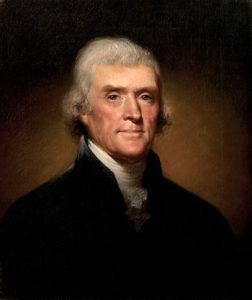
Thomas Jefferson
*Thomas Jefferson was born on this date in 1743. He was a white-American slave owner, diplomat, lawyer, architect, politician, and Founding Father of the United States of America.
Part of the First Families of Virginia (FFV), he was born at the family home in Shadwell in the (then) Colony of Virginia, where he was the third of ten children. He was of English descent and was born a British subject. His father, Peter Jefferson, was a planter and surveyor who died when Jefferson was fourteen; his mother was Jane Randolph. Peter Jefferson moved his family to Tuckahoe Plantation in 1745 upon the death of William Randolph, the plantation's owner and Jefferson's friend, who in his will had named him guardian of his children.
The Jeffersons returned to Shadwell in 1752, where Peter died in 1757; his estate was divided between his sons Thomas and Randolph. Thomas inherited approximately 5,000 acres of land, including Monticello. He assumed full authority over his property at age 21 and inherited and owned over 650 African slaves during his lifetime.
Jefferson lived in a planter economy largely dependent upon slavery and, as a wealthy landholder, used slave labor for his household, plantation, and workshops. He first recorded his slaveholding in 1774; he purchased some slaves to unite their families, and he sold others for economic reasons, primarily slaves from his outlying farms; he remained complicit with the institution of Chattel Slavery. Many historians say Jefferson didn't overwork his slaves by the conventions of his time and provided them with log cabins, fireplaces, food, clothing, and household provisions. However, slaves often had to make many of their provisions. Additionally, Jefferson gave his slaves financial and other incentives, allowing them to grow gardens and raise their chickens. His whip was employed less than other slave owners; Jefferson owned African slaves all his life.
During the American Revolution, he represented Virginia in the Continental Congress that adopted the Articles of Confederation; he drafted the law for religious freedom as a Virginia legislator. He served as the second Governor of Virginia from 1779 to 1781 during the American Revolutionary War. He became the United States Minister to France in May 1785 and the nation's first secretary of state under President George Washington from 1790 to 1793. He was the second vice president of the United States from 1797 to 1801. Jefferson and James Madison organized the Democratic-Republican Party to oppose the Federalist Party during the formation of the First Party System. He was the third president of the United States from 1801 to 1809.
In 1803, Jefferson began the process of Native American removal from the newly organized Louisiana Territory, and he signed the Act Prohibiting Importation of Slaves in 1807. After retiring from public office, Jefferson founded the University of Virginia. Jefferson also pursued the nation's shipping and trade interests against Barbary pirates and aggressive British trade policies as president. He also organized the Louisiana Purchase, almost doubling the country's territory.
Claims that Jefferson fathered his slave, Sally Hemings's children, have been debated since 1802. In 1998, a panel of researchers conducted a Y-DNA study of living descendants of Jefferson's uncle, Field, and of a descendant of Hemings's son, Eston Hemings. The results, published in Nature, matched the male Jefferson line. In 2000, the Thomas Jefferson Foundation and a team of historians whose report concluded that "the DNA study ... indicates a high probability that Thomas Jefferson fathered Eston Hemings." In July 2017, they announced that archeological excavations at Monticello revealed what they believe to have been Sally Hemings's quarters, adjacent to Jefferson's bedroom. The Thomas Jefferson Foundation stated in 2018 that it considered the issue "a settled historical matter."
After Jefferson's death on July 4, 1826, Sally Hemings was allowed by Jefferson's daughter Martha to live in Charlottesville as a free woman with her two sons until she died in 1835. Although Jefferson is regarded as a leading spokesman for democracy and republicanism in the era of the Enlightenment, some modern scholarship has been critical of Jefferson, finding a contradiction between his ownership and trading of many slaves that worked his plantations and his famous declaration that "all men are created equal."
Presidential scholars and historians praise Jefferson's public achievements, including his advocacy of religious freedom and tolerance in Virginia. The principal author of the Declaration of Independence was a proponent of democracy, republicanism, and rights, motivating American colonists to break from the Kingdom of Great Britain and form a new nation; he produced formative documents and decisions at both the state and national level. Thomas Jefferson continues to rank highly among U.S. presidents.